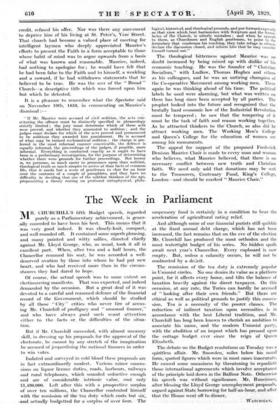The Week in Parliament
MR. CHURCHILL'S- fifth Budget speech, regarded purely as a- Parliamentary achievement, is gener- ally conceded to have been his best. This means that it • was very good indeed. It was closely-knit, compact, and well rounded off. It contained some superb phrasing, and many pointed and witty. sallies, directed chiefly against .Mr. Lloyd George, who, as usual, took it all in excellent part. -When, after two and a half hours, the Chancellor resumed his seat, he was. accorded a well- deserved ovation by those into whom he had put new heart, and who had received more than in the circum- stances they had dared to hope. .
Of course, the actual speech was to some extent an electioneering manifesto. That was expected, and indeed demanded by the occasion. But a great deal of it was devoted to a careful and reasoned defence of the financial record of- -the Government, which should be studied by all those " City" critics who never tire of accus- ing Mr. Churchill of profligacy and " unsound finance," and who have always paid such scant attention either to the facts or the difficulties of the situa- tion.
But if Mr. Churchill succeeded, with almost uncanny skill, in dressing up his proposals for the approval of the electorate, he cannot by any stretch of the imagination be accused of jeopardizing the national finances in order to win votes.
Isolated and surveyed in cold blood these 'proposals are in fact extraordinarily modest. Various minor conces.- sions on liquor licence duties, roads, harbours, railways and rural telephones, which sounded seductive enough and are of "considerable intrinsic value, cost only £1,430,000. Left after this with a prospective surplus of over ten millions, the Chancellor toutented himself with the remission of the -tea duty which costs' but six, =and actually: budgetted for a surplus of over four.. The . . suspensory fund is certainly in a condition to bear the acceleration- of agricultural rating relief.
_. And although some of our financial purists still quibble at the fixed annual debt charge, which has not been increased, the fact remains that on the eve of the election Mr. Churchill has produced the most orthodox and the most watertight budget of his series. No hidden spoils await next year's- Chancellor. Every cupboard- is now empty. But, unless a calamity occurs, he will not be confronted by a deacit.
The remission of the tea duty is extremely popular in -Unionist circles. No one denies its value as a platform point, for it affects every home, and tilts the balance of taxation heavily against the direct taxpayer. On this occasion, at any rate, the Tories can hardly be accused of " looking after their, own friends." But. there are ethical as well as political grounds to justify this conces- sion. Tea is a necessity . of the poorer classes. The reduction of indirect taxation upon necessities is in accordance with the best Liberal tradition, and Mr. Churchill has long been known to cherish an ambition to associate his • name, and the modern Unionist party, with the abolition of an impost which has pressed upon the cottage budget ever since the reign of Queen Elizabeth. • - The debate on the Budget resolutions on Tuesday was a spiritless affair. Mr. Snowden; miles below his. usual form, quoted figures which were in most cases inaccurate. He caused some uneasiness by threatening to repudiate those international agreements which involve acceptance of the principle laid down in the Balfour Note. Otherwise his speech was without significance. Mr, Runciman; after blessing the' Lloyd George unemployment prOposals, argued against State borrowing for half-an-hour, and after that the House went-off to dinner.
WATCIINIAN.
























































 Previous page
Previous page